Team
Coordinators
Karlijn van den Broek

Karlijn van den Broek is an Assistant Professor in the Innovation Studies group at the Copernicus Institute of Sustainable Development, Utrecht University, and a visiting scholar at Heidelberg University. She is an environmental psychologist focusing on people’s understanding of the complexity of environmental problems (mental models) and how this understanding influences decision-making and pro-environmental behaviour.
E-Mail: k.l.vandenbroek@uu.nl | Profile
Tina Venema
Tina Venema is an Assistant professor at the Copernicus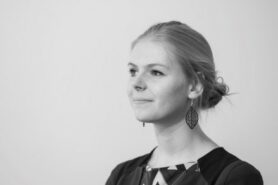 Institute of Sustainable Development. In her research, she investigates how and when people’s physical and social environment influences their decisions. A few specific examples include the effectiveness of nudge interventions, the role of habits in behaviour-change and which types of behaviours are most likely to be guided by (implicit) social norms.
Institute of Sustainable Development. In her research, she investigates how and when people’s physical and social environment influences their decisions. A few specific examples include the effectiveness of nudge interventions, the role of habits in behaviour-change and which types of behaviours are most likely to be guided by (implicit) social norms.
E-Mail: a.g.venema@uu.nl|Profile
Vivian Tunn
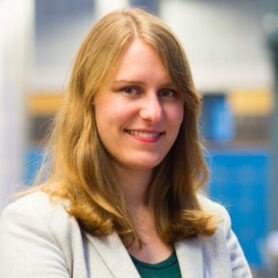 Vivian Tunn is an Assistant Professor at the Copernicus Institute of Sustainable Development. Vivian has worked on the circular economy for the last 5 years. First, she investigated circular business models for consumer markets in her PhD and then worked at CBS and contributed to the Dutch work program monitoring and steering circular economy. She is especially interested in how and why consumers adopt, use and interact with circular economy solutions and resulting rebound effects.
Vivian Tunn is an Assistant Professor at the Copernicus Institute of Sustainable Development. Vivian has worked on the circular economy for the last 5 years. First, she investigated circular business models for consumer markets in her PhD and then worked at CBS and contributed to the Dutch work program monitoring and steering circular economy. She is especially interested in how and why consumers adopt, use and interact with circular economy solutions and resulting rebound effects.
E-Mail: v.s.c.tunn@uu.nl | Profile
Researchers
Michał Bączyk

Michał is a PhD candidate in the Innovation Studies group at the Copernicus Institute of Sustainable Development, Utrecht University. He is interested in the overlap between circular and sustainable behaviour. Currently, he is working on consumer-related rebound effects of circular business models with a focus on understanding and quantifying consumers’ behavioural responses to circular products and services.
E-Mail: m.baczyk@uu.nl| Profile
Lara-Marie Bodirsky
Lara-Marie is a PhD candidate at the Copernicus Institute of Sustainable Development. With her 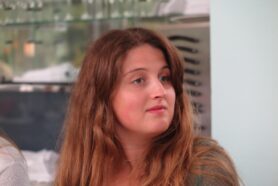 research on accelerating the transition to a Dutch circular textile economy, she is part of the innovation studies section and the energy and resources section. Coming from a background of biology and sustainable development, she is now interested in the mental models of different stakeholder groups along the textile value chain.
research on accelerating the transition to a Dutch circular textile economy, she is part of the innovation studies section and the energy and resources section. Coming from a background of biology and sustainable development, she is now interested in the mental models of different stakeholder groups along the textile value chain.
E-Mail:l.a.bodirsky@uu.nl
Kristina Bogner
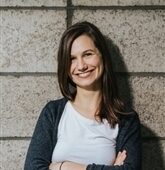 Kristina is an Assistant Professor in the Innovation studies group at the Copernicus Institute of Sustainable Development, Utrecht University. She is currently working on the transition of higher education institutions and phase-outs in transitions. She is particularly interested in how individuals feel and behave in these processes. E.g. in the changing practices and identities of (engaged) scholars in the light of the impact orientation of universities. And in emotions and coping resources and responses in phase-outs resulting from sustainability transitions.
Kristina is an Assistant Professor in the Innovation studies group at the Copernicus Institute of Sustainable Development, Utrecht University. She is currently working on the transition of higher education institutions and phase-outs in transitions. She is particularly interested in how individuals feel and behave in these processes. E.g. in the changing practices and identities of (engaged) scholars in the light of the impact orientation of universities. And in emotions and coping resources and responses in phase-outs resulting from sustainability transitions.
E-Mail: k.b.bogner@uu.nl| Profile
Martina Bubalo
 Martina Bubalo is a PhD candidate at the Department of Human Geography and Spatial Planning, Utrecht University. She has a research background in landscape perception. In her current research, she will investigate the connection between nature contact, mental health and pro-environmental behaviours among urban youth.
Martina Bubalo is a PhD candidate at the Department of Human Geography and Spatial Planning, Utrecht University. She has a research background in landscape perception. In her current research, she will investigate the connection between nature contact, mental health and pro-environmental behaviours among urban youth.
E-Mail: m.bubalo@uu.nl| Profile
Blanca Corona
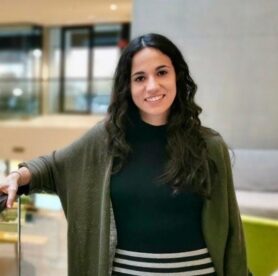 Blanca Corona is an Assistant Professor at the Copernicus Institute of Sustainable Development in the group Energy and Resources. Her research focuses on the quantitative sustainability assessment of circular and innovative products or technologies, mostly through Life Cycle Assessment approaches. She believes that understanding how users interact with product systems and their surroundings is pivotal in shaping meaningful and effective sustainable strategies. Therefore, a focal aspect of her research revolves around incorporating the human dimension into quantitative sustainability assessments.
Blanca Corona is an Assistant Professor at the Copernicus Institute of Sustainable Development in the group Energy and Resources. Her research focuses on the quantitative sustainability assessment of circular and innovative products or technologies, mostly through Life Cycle Assessment approaches. She believes that understanding how users interact with product systems and their surroundings is pivotal in shaping meaningful and effective sustainable strategies. Therefore, a focal aspect of her research revolves around incorporating the human dimension into quantitative sustainability assessments.
E-Mail: b.c.coronabellostas@uu.nl| Profile
Ine Dorresteijn
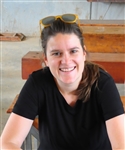 Ine is an Associate Professor at the Copernicus Institute of Sustainable Development, Utrecht University. She is an interdisciplinary researcher with main interests in human-environment interactions and sustainability. Her research revolves around topics at the intersection of society and ecosystems, such as biodiversity and wildlife, ecosystem services and disservices, livelihoods and human well-being, and the role of governance in shaping social-ecological system dynamics. Transdisciplinarity, the active involvement of stakeholders, is an important component in her research.
Ine is an Associate Professor at the Copernicus Institute of Sustainable Development, Utrecht University. She is an interdisciplinary researcher with main interests in human-environment interactions and sustainability. Her research revolves around topics at the intersection of society and ecosystems, such as biodiversity and wildlife, ecosystem services and disservices, livelihoods and human well-being, and the role of governance in shaping social-ecological system dynamics. Transdisciplinarity, the active involvement of stakeholders, is an important component in her research.
E-Mail:i.dorresteijn@uu.nl| Profile
Javanshir Fouladvand
 Javanshir Fouladvand is an Assistant Professor at Copernicus Institute of Sustainable Development, Utrecht University. He holds a PhD from Delft University of Technology in complex socio-technical (energy) system design. In his research, Javanshir investigates how the technical, behavioural, institutional and market conditions influence the decision-making processes related to the complex socio-technical (energy) system and transition. Javanshir is particularly interested in collective action and collaborative approaches to governance critical infrastructure, such as energy systems. He employs various qualitative and quantitative approaches in his studies, including agent-based modelling, optimization, questionnaires, interviews and focused groups.
Javanshir Fouladvand is an Assistant Professor at Copernicus Institute of Sustainable Development, Utrecht University. He holds a PhD from Delft University of Technology in complex socio-technical (energy) system design. In his research, Javanshir investigates how the technical, behavioural, institutional and market conditions influence the decision-making processes related to the complex socio-technical (energy) system and transition. Javanshir is particularly interested in collective action and collaborative approaches to governance critical infrastructure, such as energy systems. He employs various qualitative and quantitative approaches in his studies, including agent-based modelling, optimization, questionnaires, interviews and focused groups.
E-Mail: j.fouladvand@uu.nl | Profile
Hannah Galster
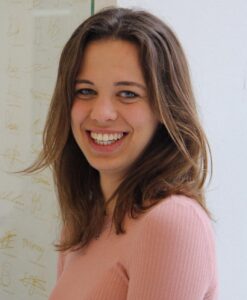 Hannah is a PhD candidate at the Energy and Resources Group of the Copernicus Institute of Sustainable Development (Utrecht University) and the Energy and Materials Transition unit of TNO (Netherlands Organization for Applied Scientific Research). Her work centers around the incorporation of human behavior in Energy System Modelling. In her interdisciplinary research, she aims to combine knowledge from social sciences with energy modelling, believing that bridging the two domains can ensure mutual benefits and improve the quality of insights derived from existing energy system models.
Hannah is a PhD candidate at the Energy and Resources Group of the Copernicus Institute of Sustainable Development (Utrecht University) and the Energy and Materials Transition unit of TNO (Netherlands Organization for Applied Scientific Research). Her work centers around the incorporation of human behavior in Energy System Modelling. In her interdisciplinary research, she aims to combine knowledge from social sciences with energy modelling, believing that bridging the two domains can ensure mutual benefits and improve the quality of insights derived from existing energy system models.
E-Mail: h.s.galster@uu.nl>| Profile
Kyra Gmoser-Daskalakis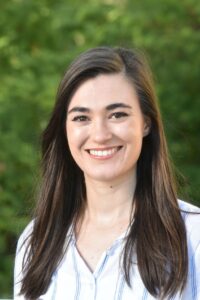
Kyra Gmoser-Daskalakis is a Postdoctoral Researcher in the Innovation Studies Group at the Copernicus Institute of Sustainable Development, Utrecht University. She studies environmental policy, governance, and behaviour with a particular focus on using network analysis to understand implementation and perceptions of nature-based solutions.
E-mail: k.s.gmoser-daskalakis@uu.nl| Profile
Christine Hedde-von Westernhagen
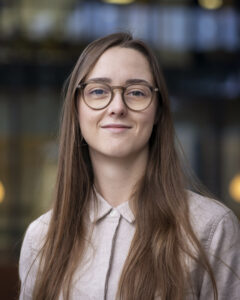
Christine is a PhD candidate at Eindhoven University of Technology within the Technology, Innovation & Society group, and a visiting researcher at the Copernicus Institute of Sustainable Development. Her work targets the interplay of individual beliefs and social norms in bringing about tipping dynamics in the energy transition. Holding a master’s degree in Applied Statistics (Utrecht University), she focuses on quantitative methods for modelling social processes. She likes to apply her methodological skills to new topics, so far covering areas such as colonial history, sociology of science, and epidemic modelling.
E-Mail: c.hedde.von.westernhagen@tue.nl| Profile
Luja von Köckritz
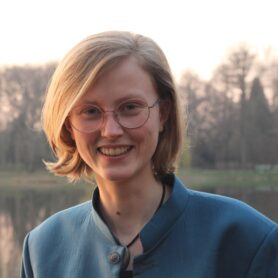
Luja researches the potential of emission reductions through circularity measures. Measures like switching to other transport modes, increasing the reuse of products, or reducing consumption require significant behavioral changes. However, in global climate models, such as the IMAGE model with which Luja works, these behavioral changes are assumed to simply get adopted. Therefore, Luja wants to improve the backing of circularity measures to see how much they could be adopted so that projections of future material and energy use in the IMAGE model are better connected with human decision-making mechanisms.
E-Mail: l.m.s.vonkockritz@uu.nl| Profile
Vinzenz Koning
 Vinzenz Koning is an assistant professor in the Energy and Resources group of the Copernicus Institute of Sustainable Development of Utrecht University. His research focusses on energy system modelling and energy technology assessment. He employs a wide range of computational models (optimization models, agent-based models and machine learned models) to study aspects of, and make scenarios of, the energy transition. One of his research lines focusses on the analysis of behaviour and decision making and its integration into energy models.
Vinzenz Koning is an assistant professor in the Energy and Resources group of the Copernicus Institute of Sustainable Development of Utrecht University. His research focusses on energy system modelling and energy technology assessment. He employs a wide range of computational models (optimization models, agent-based models and machine learned models) to study aspects of, and make scenarios of, the energy transition. One of his research lines focusses on the analysis of behaviour and decision making and its integration into energy models.
E-mail: v.koning@uu.nl|Profile
Laura Piscicelli
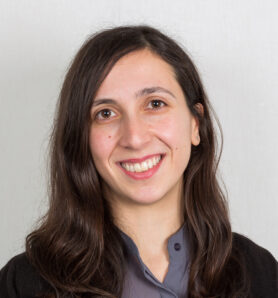 Laura Piscicelli is an Assistant Professor at the Copernicus Institute of Sustainable Development, Utrecht University. Her research focuses on the role of consumers in the adoption and diffusion of sustainable products, services and business models. Laura is an editorial member of the journal Sustainable Production and Consumption.
Laura Piscicelli is an Assistant Professor at the Copernicus Institute of Sustainable Development, Utrecht University. Her research focuses on the role of consumers in the adoption and diffusion of sustainable products, services and business models. Laura is an editorial member of the journal Sustainable Production and Consumption.
E-Mail: l.piscicelli@uu.nl | Profile
Hens Runhaar
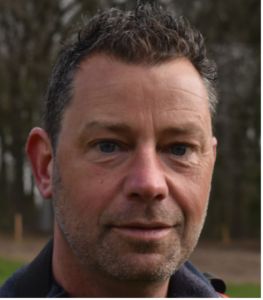
Hens Runhaar is Associate Professor of Governance of Nature and Biodiversity at Copernicus Institute of Sustainable Development, Utrecht University and Visiting Professor at Wageningen University and Research. His research focuses on interventions by governments, companies and NGOs to protect or enhance nature and biodiversity, with a special interest in agriculture. Part of his work focuses on how citizens, in their different roles as consumers, voters and volunteers, can be stimulated to positively contribute to biodiversity recovery.
E-Mail: h.a.c.runhaar@uu.nl| Profile
Annuska Toebast
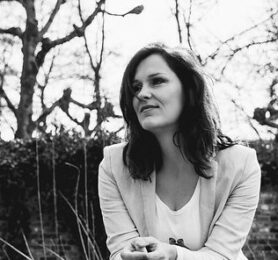 Annuska is a PhD candidate in the Innovation Studies group at the Copernicus Institute of Sustainable Development. Annuska aims to connect research and practice in her work. With a background in marketing and communications, her research focuses on sustainable fashion consumption. Annuska works on her PhD research, exploring the perspective of sustainable fashion retailers on how they instigate consumers’ sustainable fashion behavior. Annuska has a Masters’ degree in Business Communication, as well as a Masters’ degree in Business Strategy (both Radboud University), and studied at Berkeley (University of California).
Annuska is a PhD candidate in the Innovation Studies group at the Copernicus Institute of Sustainable Development. Annuska aims to connect research and practice in her work. With a background in marketing and communications, her research focuses on sustainable fashion consumption. Annuska works on her PhD research, exploring the perspective of sustainable fashion retailers on how they instigate consumers’ sustainable fashion behavior. Annuska has a Masters’ degree in Business Communication, as well as a Masters’ degree in Business Strategy (both Radboud University), and studied at Berkeley (University of California).
E-Mail: a.toebast-wensink@uu.nl | Profile
Leanda Vedder
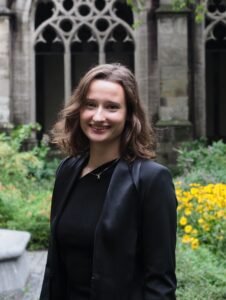 Leanda Vedder is an interdisciplinary PhD candidate at the Energy and Resources as well as the Innovation Studies group of the Copernicus Institute of Utrecht University. She has a particular interest in sustainability issues at the interface of people´s perception of environmental problems, environmental impact and technology. Her research is centered on the acceptability of wind energy and investigates the involved stakeholder’s perception of the impact of wind power deployment. Close collaboration with the Horizon Europe project WIMBY forms the foundation of her work. She has a background in environmental system sciences with economics from the University of Graz and a Master’s degree in Sustainable Development from Utrecht University. During her Master’s, she was a research assistant for an ongoing research project that maps the perception of biodiversity loss within the Utrecht University community.
Leanda Vedder is an interdisciplinary PhD candidate at the Energy and Resources as well as the Innovation Studies group of the Copernicus Institute of Utrecht University. She has a particular interest in sustainability issues at the interface of people´s perception of environmental problems, environmental impact and technology. Her research is centered on the acceptability of wind energy and investigates the involved stakeholder’s perception of the impact of wind power deployment. Close collaboration with the Horizon Europe project WIMBY forms the foundation of her work. She has a background in environmental system sciences with economics from the University of Graz and a Master’s degree in Sustainable Development from Utrecht University. During her Master’s, she was a research assistant for an ongoing research project that maps the perception of biodiversity loss within the Utrecht University community.
E-Mail: l.vedder1@uu.nl|Profile
Emma Windey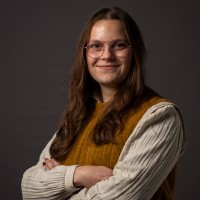
Emma Windey is a PhD-candidate in the Environmental governance group at the Copernicus institute. She is studying adoption of more biodiverse and species-rich grasslands at Dutch dairy farms. In her research she tries to cover the individual scale as well as the system-level by looking at the drivers and barriers that individuals face, while also looking at the impact of other actors, and larger systematic roadblock and opportunities.
E-mail: e.c.l.windey@uu.nl | Profile
Student assistant
Kirsten Slikkerveer

Kirsten previously studied International Development Management at Van Hall Larenstein in Velp. Now, she studies a Master in Sustainable Development at Utrecht University, specialising in Political Ecology and Sociology. In her role as student assistent of the Special Interest Group on Sustainable Behaviour, she assists with communication tasks. Feel free to contact her through the E-mail adress below if you have any ideas for seminars, communication or collaboration.
E-mail: c.m.j.slikkerveer@uu.nl

